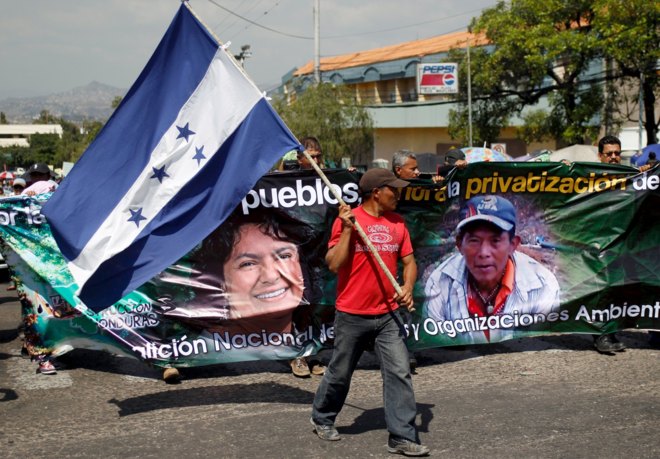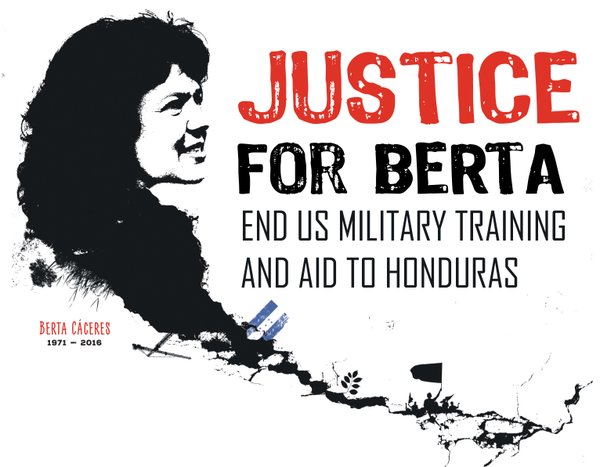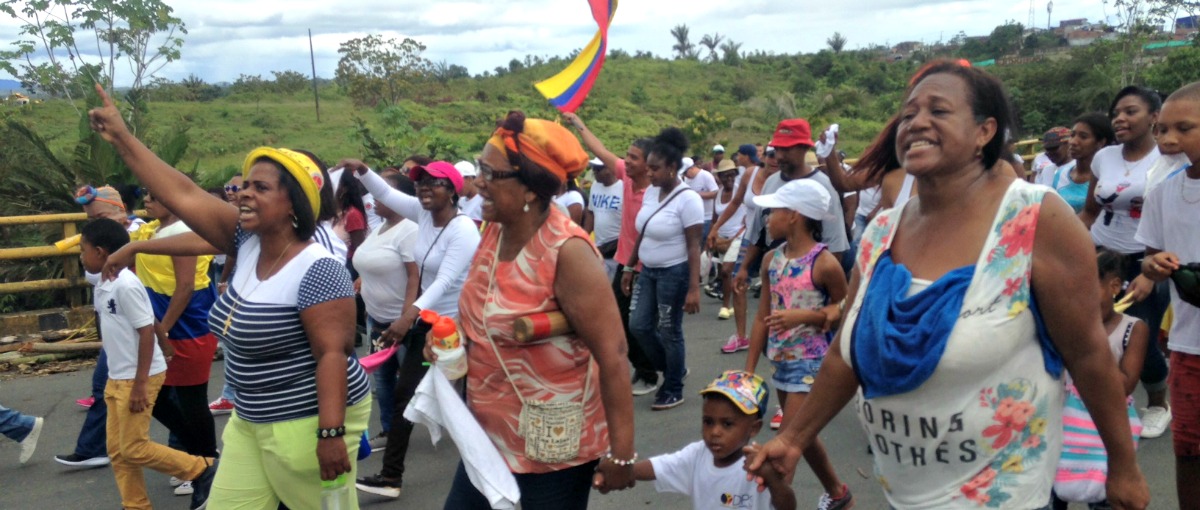OFRANEH
, 25 de mayo: Marcha de las mujeres indígenas y negras en Tegucigalpa, exigiendo un alto a la criminalización y el enjuiciamiento de las defensoras de derechos humanos y #JusticiaparaBertaCaceres)
En marzo de 2017,
Global Witness publicó un informe
que nombraba a Honduras como el país más peligroso del mundo para los defensores de derechos humanos y medioambientales. Esto causó conmoción en el gobierno hondureño y los medios de comunicación, especialmente por la participación de funcionarios gubernamentales en empresas transnacionales y proyectos de desarrollo. Unos días más tarde, dos miembros del personal de CRLN y un miembro de la Junta Directiva viajaron a Honduras en una delegación de La Voz de los de Abajo. Se unieron a muchos visitantes internacionales, organizaciones y otras delegaciones en el país para actos de conmemoración del primer aniversario de la muerte de Berta Cáceres. Nuestra delegación vio y habló directamente con defensores de derechos humanos, líderes de comunidades indígenas, obreros, campesinos, miembros de la oposición y estudiantes que explicaron el peligro de defender sus derechos en Honduras. El siguiente informe refleja las demandas y peligros descritos en el reporte de Global Witness y lo que escuchamos en nuestra delegación en marzo de las comunidades afectadas. En Honduras,
como en toda América Latina
, ser un defensor ambiental y de derechos humanos es un gran peligro.
El representante de OFRANEH y líder Garifuna, Cesar Geovany Bernárdez, fue detenido el 18 de mayo y acusado de usurpación o posesión ilegal de tierra por el empresario canadiense Patrick Forseth de CARIVIDA.
Cesar Geovany Bernárdez fue acusado de usurpar tierras que se encuentran dentro del título comunitario otorgado a la comunidad garífuna de Guadalupe. La delegación de La Voz de los de Abajo se reunió con Cesar y otros líderes garífunas en el área de Barra Vieja en Marzo. Los líderes garífunas hablaron con la delegación sobre cómo han estado luchando contra las ventas ilegales de tierras de sus comunidades a proyectos de desarrollo estadounidenses y canadienses. Su comunidad ha estado rodeada de guardias privados, militares y cercas.
CARIVIDA Villas
, un proyecto canadiense de desarrollo turístico y de vivienda, está ilegalmente en posesión de tierras garífunas y obtuvo los documentos de propiedad de tierras, así como las órdenes de captura de Geovany mediante corrupción y abuso de autoridad con la ayuda del gobierno hondureño. Geovany fue puesto en libertad al día siguiente; Sin embargo, se le dieron medidas sustantivas, lo que significa que su libertad está restringida. Tiene que firmar con frecuencia ante un juez en Trujillo y no se le permite salir del país, entre otras restricciones.
OFRANEH publicó una declaración que concluye
: “Una vez mas ratificamos y denunciamos que las comunidades Garífunas de la Bahia de Trujillo, afectadas por los proyectos turísticos y habitacionales de la mafia canadiense, nunca fueron consultadas para obtener su consentimiento previo, libre e informado; violando de esta forma el Convenio 169 de la OIT.”
Además,
la criminalización de los campesinxs continúa en la región sur de Honduras.
Defensores en Línea informan que el campesino y pescador Julio César Canales Torres fue detenido el 14 de mayo por usurpación de tierras.
Actualización del caso de Berta Cáceres
El 17 de mayo, el equipo legal que representa a Berta Cáceres y su familia denunció ante el Ministerio Público de Tegucigalpa la irregularidad con que se está llevando a cabo la investigación y proceso judicial de su asesinato. Al equipo legal de la familia se le ha negado repetidamente el acceso a la información sobre el caso. Por ejemplo, habia una audiencia programada para el caso de Berta el 24 de mayo; Sin embargo, el equipo legal que representa a su familia tuvo que pedir por segunda vez que se posponga la audiencia, ya que la información necesaria no fue entregada a tiempo a los abogados. La audiencia está ahora programada para el 7 de junio.
La delegación se reunió con la hija de Berta Cáceres y con COPINH, que exigen una investigación independiente de su asesinato y que los autores intelectuales sean llevados ante la justicia.
Trabajadores
Empleadas de Delta despedidas
“Entre los días 5 y 7 de abril de 2017, Delta Apparel, con sede en Estados Unidos, despidió a más de 40 trabajadores que sufren de lesiones músculo-esqueléticas debilitantes en su fábrica de Villanueva, Cortés, Honduras. 25 de los 40 trabajadores se han negado a aceptar los asentamientos y están exigiendo que Delta Apparel les devuelva su trabajo “.
Por favor lea aquí
, acerca de cómo puede apoyar a las 25 empleadas despedidas a recuperar su trabajo y exigir que Delta US Apparel deje de exponer a sus trabajadores a lesiones y factores de riesgo para la salud.
Campesinxs se declararon en huelga contra Tela Railroad Company
Más de 2.000 campesinxs hondureñxs se apoderaron de diez granjas durante 17 días pertenecientes a la Tela Railroad Company, una compañia sucesora de la ahora disuelta United Fruit Company. Los campesinxs exigían mejores condiciones de salud y de trabajo. Después de 17 días de huelga, la empresa y los trabajadores llegaron a un acuerdo. Sin embargo,
como informa Radio Progreso
, los riesgos para la salud y los peligros de trabajar en el campo y con productos químicos continúan para los campesinxs.
Elecciones de noviembre de 2017
Al acercarse las elecciones de 2017, la Alianza de Oposición, formada por partidos políticos de oposición , incluido el Partido Anticorrupción (PAC) y LIBRE, eligió a Salvador Nasralla como candidato para representar a la oposición en las elecciones de 2017.
Informe sobre asesinatos de la DEA en Ahuas, Honduras
The Center for Economic and Policy Research explica:
”
Un nuevo
informe
de las Oficinas del Inspector General (OIG) del Departamento de Justicia (DJ) y el Departamento de Estado (DE) de los EEUU afirma que agentes de la Administración para el Control de Drogas estadounidense (DEA, por sus siglas en inglés) se encontraban bajo control operacional durante un
incidente notorio en Ahuas
, Honduras, en mayo de 2012, en el que cuatro campesinos miskitu fueron asesinados y otros tres gravemente heridos. La evidencia encontrada contradice
anteriores declaraciones
de oficiales de la DEA según las cuales sus agentes jugaron tan solo un rol de “apoyo” en el incidente, “no dispararon una sola ráfaga”, siendo “la conducta del personal de la DEA consistente con los protocolos, políticas y procedimientos vigentes de la agencia”.










